So it’s nearly Christmas now and I won’t sleep, I’ll think of my mother eating pistachios and drinking beer, for so many years, leaving the shells on the counter – thought maybe that’s what Santa ate and the year when I begged and she made popcorn balls in a big pot on the stove in our apartment that had no walls – a studio, but I didn’t know that word then. That year she hung a string of light-up chili peppers and we had an endless supply of Ferrara Pan. One  of the good days. Tonight, on my way to the first family Christmas I’ll have attended in thirteen years, I make tiger butter in the hotel microwave. This thing that sounds like a movie phrase – “in laws.” On my way to see the in laws. For so many years spent Christmas eve in the strip club/morning alone walking up Mission Street at seven a.m., wandering into churches to see the poinsettias and feel difficult things looking at families, hear the music. This year
of the good days. Tonight, on my way to the first family Christmas I’ll have attended in thirteen years, I make tiger butter in the hotel microwave. This thing that sounds like a movie phrase – “in laws.” On my way to see the in laws. For so many years spent Christmas eve in the strip club/morning alone walking up Mission Street at seven a.m., wandering into churches to see the poinsettias and feel difficult things looking at families, hear the music. This year 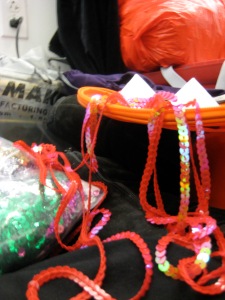
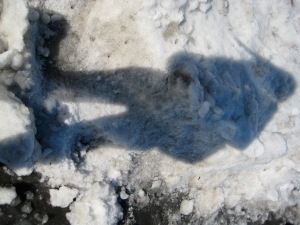
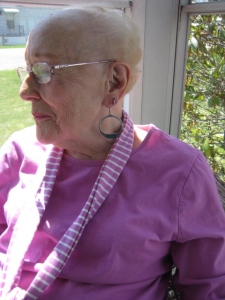 we have
we have 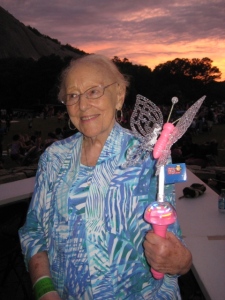 gasoline and hotel cable television, we’re so wealthy. This year, don’t tell, I send money to children in other countries for water filters and deworming medicines, wrap the receipts in red and green construction paper and give these as gifts. It isn’t altruism – not nearly enough. Ask Peter Singer. There are so many things I regret/yearn for. I’ve forgotten half of what my grandmother told me, feel it slipping through the open space between my knuckles. On the hotel TV there is Danny Kaye, she loved the actors who could dance. This is the first Christmas with her gone, and I feel depleted by her absence. Want her back, I missed so much, spent so many years feeling alone, and took home her notebook after the funeral and there was what she’d written about her own loneliness. That was the saddest moment, the most monumental regret. This morning in southern Oregon, the sunrise turned the sky electric neon pink and the clouds gold and striated over it like spread butter. The dog making sharp turns on the beach and flinging up wet sand with his tongue out and milky quartz – one million years of trapped water turned to milk/ice/glass and worried smooth, palm-sized, magic, redwood. Won’t sleep because I don’t want to miss the sound of traffic on the highway, thick red glass and Washington wine, Danny Kaye singing the songs my grandmother knew and sang any time the words struck her. Just before she died, her teeth out, gasping, she said “you’re a remarkable woman,” and I want, want, want to believe it.
gasoline and hotel cable television, we’re so wealthy. This year, don’t tell, I send money to children in other countries for water filters and deworming medicines, wrap the receipts in red and green construction paper and give these as gifts. It isn’t altruism – not nearly enough. Ask Peter Singer. There are so many things I regret/yearn for. I’ve forgotten half of what my grandmother told me, feel it slipping through the open space between my knuckles. On the hotel TV there is Danny Kaye, she loved the actors who could dance. This is the first Christmas with her gone, and I feel depleted by her absence. Want her back, I missed so much, spent so many years feeling alone, and took home her notebook after the funeral and there was what she’d written about her own loneliness. That was the saddest moment, the most monumental regret. This morning in southern Oregon, the sunrise turned the sky electric neon pink and the clouds gold and striated over it like spread butter. The dog making sharp turns on the beach and flinging up wet sand with his tongue out and milky quartz – one million years of trapped water turned to milk/ice/glass and worried smooth, palm-sized, magic, redwood. Won’t sleep because I don’t want to miss the sound of traffic on the highway, thick red glass and Washington wine, Danny Kaye singing the songs my grandmother knew and sang any time the words struck her. Just before she died, her teeth out, gasping, she said “you’re a remarkable woman,” and I want, want, want to believe it.
Last Tuesday, my grandmother passed away. There are so many ways to say that someone has died, but no good ones. It wasn’t like that – passing. She said, “I’m sorry this is taking so long,” even though it wasn’t. She said, “okay, I’m not going anywhere,” and sat up sweating and lived another day to eat cheetos and tell me about prohibition. She’d been having seizures that made her arms flail and made her drop things and exhausted her. We rented a commode. We held her up to bathe her. “Put your arms around me,” I said. And she did, leaning her weight into mine and resting her soft cheek on my shoulder.
“I can do it myself,” she kept saying to all of us. “Bring me my cane, I’ll walk.” And some days, she did do it herself, surprising us all. On Thursday night, she was tired, but singing. On Friday morning, she couldn’t get out of bed even to pee. We bought “Silhouettes” in pink and blue. On Saturday she walked all the way to the porch and ate barbecued chicken and swore.
At the grocery store, I picked out a pink sippy cup with Disney princesses on it because she’d just told me about the time her older brother took her to see Snow White in the movie theater when she was ten, she’d been so frightened of the queen, she loved a Saturday matinee. When I showed her the cup and asked what she’d like in it, water, juice — “whiskey,” she said. And that’s what she had.
There is so much more and I can’t say it.
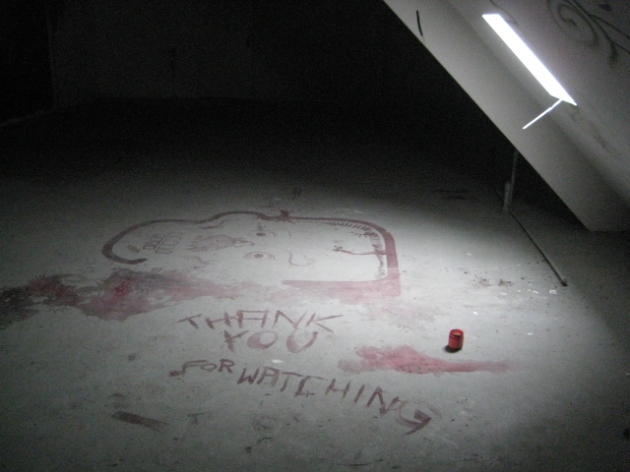 All through the Czech Republic and East Germany there are fields of sunflowers and fields of corn. By the side of the road are small purple and white flowers. We sleep in towns whose names we don’t know and we shoot in shut down factories, an abandoned prison, a mansion filled with stoups and crucifixes in glass display cases. We shoot in a garden, two days before they are to hold a wedding. While Sandra Romain dunks a Czech boy in the water fountain to fetch coins, deliveries are made – boxes of fruit, new white plates, a pearly smooth fondant cake in three tiers, with rolled white lettering and scalloped edges. For lunch we eat pickles, blue cheese flavored potato chips. We send Sylvia out for stockings, and then we send her
All through the Czech Republic and East Germany there are fields of sunflowers and fields of corn. By the side of the road are small purple and white flowers. We sleep in towns whose names we don’t know and we shoot in shut down factories, an abandoned prison, a mansion filled with stoups and crucifixes in glass display cases. We shoot in a garden, two days before they are to hold a wedding. While Sandra Romain dunks a Czech boy in the water fountain to fetch coins, deliveries are made – boxes of fruit, new white plates, a pearly smooth fondant cake in three tiers, with rolled white lettering and scalloped edges. For lunch we eat pickles, blue cheese flavored potato chips. We send Sylvia out for stockings, and then we send her 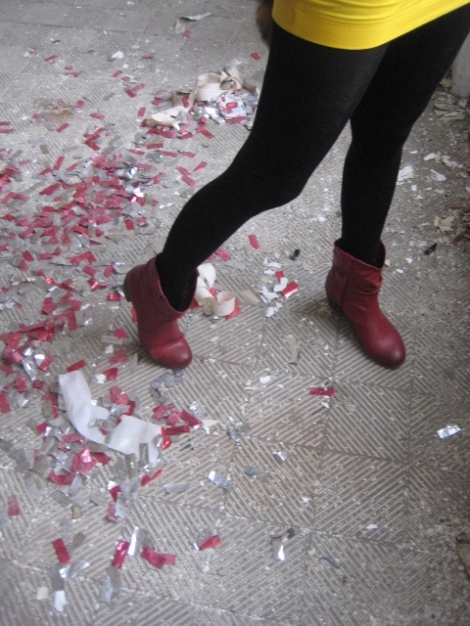 out again for more stockings. We send Pavel for towels, a broom, a bucket, a ladder, for more stockings still. We send Jana to pick up the tests. The male models put lydocaine on their asses even when we ask them not to, worried for their health. At night we search for a martini – there are no cocktails in the Czech Republic. No ice. We sleep on single beds in hotel rooms we have to lock ourselves into at night. We walk
out again for more stockings. We send Pavel for towels, a broom, a bucket, a ladder, for more stockings still. We send Jana to pick up the tests. The male models put lydocaine on their asses even when we ask them not to, worried for their health. At night we search for a martini – there are no cocktails in the Czech Republic. No ice. We sleep on single beds in hotel rooms we have to lock ourselves into at night. We walk 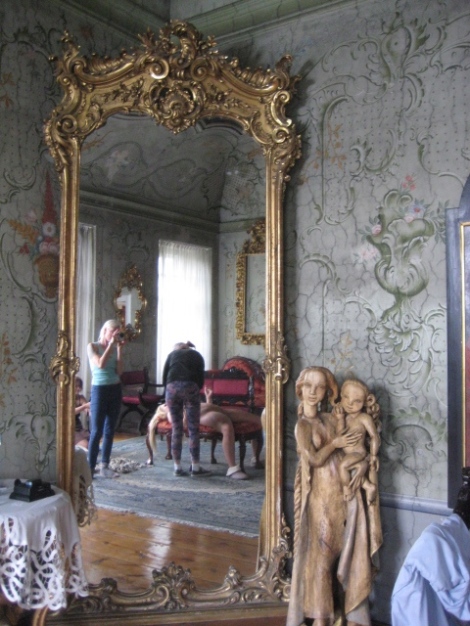 through cobbled town squares at midnight; the church towers are all lit from below, glowing stone buttresses and ancient clocks. All the models are young and beautiful and speak very little English. The men sit between scenes with erections poking through their towels. We pull stockings on and rip them. We hairspray the runs. We double condom the dildoes and wipe the floggers with premoistened antibacterial cloths. Tomas the translator – who is a weightlifter and a porn performer and who sits every night at dinner with nothing but a glass of water while we have cream soups and boiled potatoes and Bohemia Sekt – rolls his eyes at us constantly, two loud American girls whose suitcases of makeup and shoes and
through cobbled town squares at midnight; the church towers are all lit from below, glowing stone buttresses and ancient clocks. All the models are young and beautiful and speak very little English. The men sit between scenes with erections poking through their towels. We pull stockings on and rip them. We hairspray the runs. We double condom the dildoes and wipe the floggers with premoistened antibacterial cloths. Tomas the translator – who is a weightlifter and a porn performer and who sits every night at dinner with nothing but a glass of water while we have cream soups and boiled potatoes and Bohemia Sekt – rolls his eyes at us constantly, two loud American girls whose suitcases of makeup and shoes and 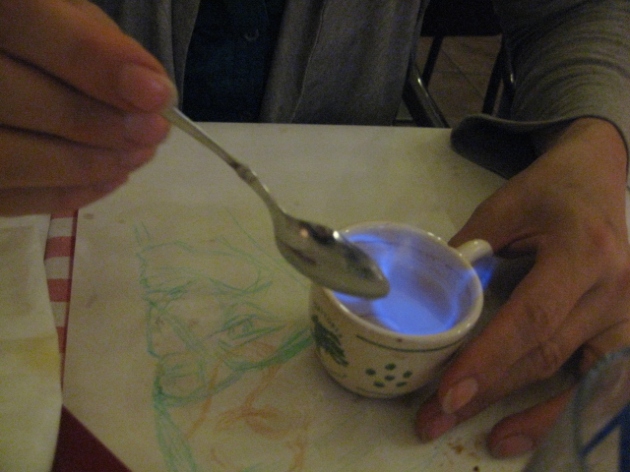 hemp rope he must drive from Prague to Moravia, from Mlada Boleslav to Berlin. We shoot in the rain. A whole day in the rain, naked in stockings and heels, climbing on old tires and walking down railroad tracks with a whip and making faces and saying dirty things in English that the other performers don’t understand. We shoot in puddles and dirt and on concrete, beneath the steel support beams of a half-demolished factory. In all the small towns, at a certain time on a certain afternoon (we don’t know what day or time, because we lose track of the days and the times except
hemp rope he must drive from Prague to Moravia, from Mlada Boleslav to Berlin. We shoot in the rain. A whole day in the rain, naked in stockings and heels, climbing on old tires and walking down railroad tracks with a whip and making faces and saying dirty things in English that the other performers don’t understand. We shoot in puddles and dirt and on concrete, beneath the steel support beams of a half-demolished factory. In all the small towns, at a certain time on a certain afternoon (we don’t know what day or time, because we lose track of the days and the times except 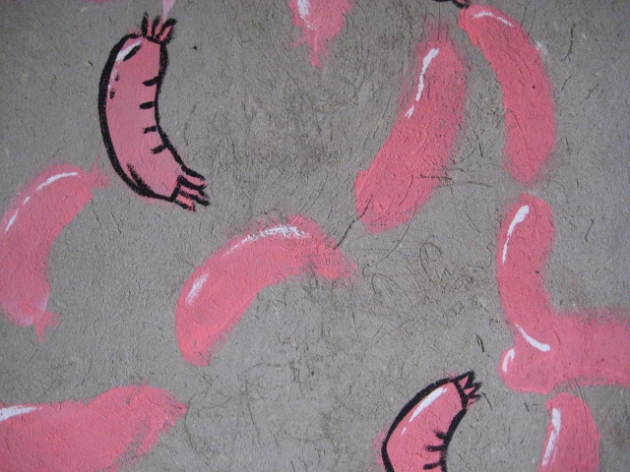 to say we have this many hours to shoot, this many hours left before we lose the light) music comes from a loudspeaker somewhere, music and a man’s voice – Tomas says it is a “what do you call it” and I say church?
to say we have this many hours to shoot, this many hours left before we lose the light) music comes from a loudspeaker somewhere, music and a man’s voice – Tomas says it is a “what do you call it” and I say church?  And he says “yes, church” and each day, for three or four minutes we cut and hold until it stops.
And he says “yes, church” and each day, for three or four minutes we cut and hold until it stops.
Today is the International Day to End Violence Against Sex Workers. You can read more about this day here.
At this point in my life, I’m lucky to be a sex worker with a lot of resources and a strong sense of agency. This was not always the case. During a time when I had far fewer resources, I am very grateful to have had St. James Infirmary. Occasionally, I went to the Wednesday night drop-in for antibiotics or acupuncture, but most weeks I went just to be in a place where I could be surrounded by other sex workers. A place where I felt normal.
Sequoia was a street worker I met there. She was always smiling. She smiled at me in the clinic, trying on silky tank tops from the donation closet. She smiled every time I saw her on Sixth Street, where her beauty was so striking as to be discordant. We exchanged hey girl’s and I was flattered that she remembered who I was. I did not know her well, but I can never forget her beautiful, kind, smiling face. She was nice to me in a way that felt tremendously generous. It seemed to evidence a generosity of spirit that is rare, and fragile. It was a time in my life when I felt very alone, partially because I had a job where I had sex for money, and I hadn’t yet surrounded myself with people who knew that job wasn’t evidence of my brokenness, and so I was afraid I might actually be broken. I was, and am, so grateful for her kindness.
Sequoia was killed, probably by a client, while working in the park. In the clinic that week they made a collage, lit a candle. Another woman said “I should have been with her that night. She shouldn’t have been working alone.”
Today I read this article, and the phrase “sex work isn’t stigmatized because it is dangerous. Sex work is dangerous because it is stigmatized.” There’s a lot I can say about that idea, but mostly, I want to say this: no one should be working alone.
I mourn today for Sequoia, and I light a candle for the men and women who are on this list, and for the ones who aren’t, and for the ones whose names and stories have been forgotten.
 Yesterday, I tied up cute smarty pants Penny Pax. My bondage is getting better, but it’s like poems – always one tiny thing I wish I’d done differently – always a way to make it prettier or simpler or more complicated. Between scenes, she sat by the heater as I pulled the ropes around her ankles, and we talked poetry and hysterectomies and being a Spiegler girl. This year, Penny tells me, they had a Spiegler girl Thanksgiving (like a Charlie Brown Christmas, but with more Uggs) and I remembered when me and Annette and Gia and Roxy were going to get matching sweatpants and ate a lot of mashed potatoes in Woodland Hills. I’m thirty one now, and I’m trying, trying, trying to write this. Meanwhile there are scenes and scenes and scenes and a Christmas tree, bourbon, dog, poems on subject/object/sleep/money, and a family visit to the land of snowfall and corn pudding and peas my mother cooks in an electric wok, between tequila drinks.
Yesterday, I tied up cute smarty pants Penny Pax. My bondage is getting better, but it’s like poems – always one tiny thing I wish I’d done differently – always a way to make it prettier or simpler or more complicated. Between scenes, she sat by the heater as I pulled the ropes around her ankles, and we talked poetry and hysterectomies and being a Spiegler girl. This year, Penny tells me, they had a Spiegler girl Thanksgiving (like a Charlie Brown Christmas, but with more Uggs) and I remembered when me and Annette and Gia and Roxy were going to get matching sweatpants and ate a lot of mashed potatoes in Woodland Hills. I’m thirty one now, and I’m trying, trying, trying to write this. Meanwhile there are scenes and scenes and scenes and a Christmas tree, bourbon, dog, poems on subject/object/sleep/money, and a family visit to the land of snowfall and corn pudding and peas my mother cooks in an electric wok, between tequila drinks. 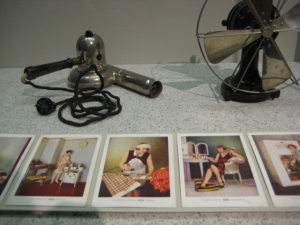 In the place where most of my family lives, there are long, pretty drives and cheap, cheap groceries and knit hats and big houses with a lot of paint gone. My grandmother believes she is so old and in the morning at a diner where the waitress knows her (one poached egg, one piece of salt-rising toast) she looks at a little tin poster of Debbie Reynolds that I brought her from Berlin, where I don’t tell her I went last month for the porn film festival, and she says “I’m eighty-six and it is so special when people think of me.” I want to tell her how very, very much I think of her, but I will never be able to communicate this. Instead we go to the cemetery and visit her friends. It’s cold and she leans on my arm to maneuver the hilly grass and dry leaves between the graves.
In the place where most of my family lives, there are long, pretty drives and cheap, cheap groceries and knit hats and big houses with a lot of paint gone. My grandmother believes she is so old and in the morning at a diner where the waitress knows her (one poached egg, one piece of salt-rising toast) she looks at a little tin poster of Debbie Reynolds that I brought her from Berlin, where I don’t tell her I went last month for the porn film festival, and she says “I’m eighty-six and it is so special when people think of me.” I want to tell her how very, very much I think of her, but I will never be able to communicate this. Instead we go to the cemetery and visit her friends. It’s cold and she leans on my arm to maneuver the hilly grass and dry leaves between the graves.
Our tree has glitter balls and disco balls and I spend eighteen hours in front of it, trying to write. When you are directing a porn movie you should always be watching for the moment when you are bored. If you are bored it is time to stop what’s happening and invent a new action.
My mother does the splits at every party at around 11pm. After that she moves on to arm wrestling all comers.
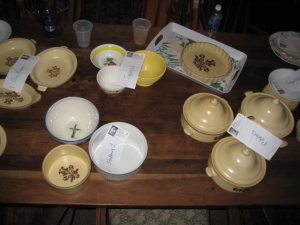 In the town where my grandmother lives, there is always weather outside the windows. After turkey, after mince-meat and lemon merengue and coffee beside the big nameless silver tools and machines in my uncle’s warehouse, we drive through flurries that thrill our California brains, my teenage sisters in the back seat talking about vampire romance. Back at the Days Inn, we hurry to our room to watch chunks of white fly past the window, too dazzled and tired to be out there tasting it.
In the town where my grandmother lives, there is always weather outside the windows. After turkey, after mince-meat and lemon merengue and coffee beside the big nameless silver tools and machines in my uncle’s warehouse, we drive through flurries that thrill our California brains, my teenage sisters in the back seat talking about vampire romance. Back at the Days Inn, we hurry to our room to watch chunks of white fly past the window, too dazzled and tired to be out there tasting it.
So I’ve had some surgery and been laying in bed for three weeks, not writing, not reading anything except what can be found on the internet. Looking at maps of Berlin and Copenhagen and northern Italy and handmade jewelry out of pennies and new pajamas I’m not going to buy because that would be giving in. It’s not the kind of surgery you will notice in a picture – though that would be more exciting. Instead it’s the kind that just makes you tired for a long time so when you try to go back to work too soon you end up in your lingerie and perfect imitation sexy military uniform, hair done, eyelashes, and lying on a prop bed with a gallon ziplock of ice unable to spray a new recruit with water and tell her what a lesbian she’s about to be. It’s embarrassing, not being able to do your job.
Looking at maps of Berlin and Copenhagen and northern Italy and handmade jewelry out of pennies and new pajamas I’m not going to buy because that would be giving in. It’s not the kind of surgery you will notice in a picture – though that would be more exciting. Instead it’s the kind that just makes you tired for a long time so when you try to go back to work too soon you end up in your lingerie and perfect imitation sexy military uniform, hair done, eyelashes, and lying on a prop bed with a gallon ziplock of ice unable to spray a new recruit with water and tell her what a lesbian she’s about to be. It’s embarrassing, not being able to do your job.
On November 22nd I will have worked for the same company for ten years. I’m hoping for a gold-plated thong, but I hear the traditional tenth anniversary metal is only tin and I already have an aluminum foil bikini. So.
It will have to be cupcakes.
 I’m thirty one now and I’ve eaten caviar and been to Africa. My mother gave up Japan to have babies. I’ve never jumped out of an airplane but I’ve jumped inside an airplane hangar of trampolines and I’ve been filmed emerging from the waves in Cabo San Lucas like a porn Charlie’s Angel. Next week I’ll be in Denmark, searching out the home of Hamlet. I’ll be in Berlin, answering questions about a film I cowrote. Caviar is like little bubbles full of salt water. Pop pop in your teeth. I’ve seen a temple submerged in the Nile for fifty years and then taken apart in 40,000 pieces and rebuilt. Seen the comic-strip painted walls of a mountain tomb three thousand years old. I’ve eaten mashed potatoes in both New York, New York and “New York New York” Las Vegas. I’ve been paid to spank a Tony award winning Broadway producer and to publish four poems. I can read music and apologize in four languages including American Sign. I can cook a turkey and a tofurkey on the same afternoon. I’m thirty one and some days rich off pornography and I still haven’t finished a book or really learned to play the violin or started an orphanage or a foster kids scholarship fund. I’m grateful that balancing checkbooks is a thing of the past.
I’m thirty one now and I’ve eaten caviar and been to Africa. My mother gave up Japan to have babies. I’ve never jumped out of an airplane but I’ve jumped inside an airplane hangar of trampolines and I’ve been filmed emerging from the waves in Cabo San Lucas like a porn Charlie’s Angel. Next week I’ll be in Denmark, searching out the home of Hamlet. I’ll be in Berlin, answering questions about a film I cowrote. Caviar is like little bubbles full of salt water. Pop pop in your teeth. I’ve seen a temple submerged in the Nile for fifty years and then taken apart in 40,000 pieces and rebuilt. Seen the comic-strip painted walls of a mountain tomb three thousand years old. I’ve eaten mashed potatoes in both New York, New York and “New York New York” Las Vegas. I’ve been paid to spank a Tony award winning Broadway producer and to publish four poems. I can read music and apologize in four languages including American Sign. I can cook a turkey and a tofurkey on the same afternoon. I’m thirty one and some days rich off pornography and I still haven’t finished a book or really learned to play the violin or started an orphanage or a foster kids scholarship fund. I’m grateful that balancing checkbooks is a thing of the past.
Every other poem or journal entry or blog post I write is an inventory, and for this lo siento. Je suis desolee. I’m sorry.
Yesterday, we were girdled secretaries with glossy toes. Gia was back and she bounced, and we squealed to see her. We all wanted to take off our perfect costumes because the heat on the top floor of the castle is thick and sleepy and damp in mid-July. Our hair bubbled up frothy on our heads, full of pins and bows. Tonight there will be cupcakes and milk onstage. Monday was jockstraps  and leather somewhere off Castro Street. We too are image makers and the impulse is deep and old and persistent. Is this about money? And yet it’s also an act of love. But not the way they always taught: “love-making,” a phrase that never made sense to me. This is not how love is made. It’s concrete and viscera, the wet and hard and dirt and rope. This work smells like braking trains and oranges and that’s a different kind of love.
and leather somewhere off Castro Street. We too are image makers and the impulse is deep and old and persistent. Is this about money? And yet it’s also an act of love. But not the way they always taught: “love-making,” a phrase that never made sense to me. This is not how love is made. It’s concrete and viscera, the wet and hard and dirt and rope. This work smells like braking trains and oranges and that’s a different kind of love.
“You’re doing a public service,” someone tells me, but it isn’t true. As the power dynamics change, it only becomes more mine.
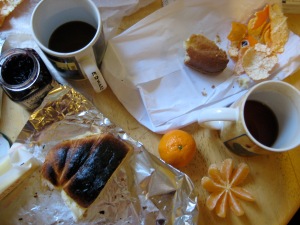 Ask me what I want on any given day and I can not tell you. “Sleep,” I’ll say, or “popcorn.” Nothing changes that, no matter what ceremonies, no matter what books and planes. I want: 500 words a day, all pink everything, whiskey, beauty, complex problems to unravel. I want wet and glitter and love. But none of that illuminates a path.
Ask me what I want on any given day and I can not tell you. “Sleep,” I’ll say, or “popcorn.” Nothing changes that, no matter what ceremonies, no matter what books and planes. I want: 500 words a day, all pink everything, whiskey, beauty, complex problems to unravel. I want wet and glitter and love. But none of that illuminates a path.
It’s a new project now, being an ageless age and evil in photographs and the painful sorting of poems in Oakland with Joseph. How can I be a maker? 500 words a day, minimum.
“I won’t put my makeup on for less than 400 dollars,” I once heard a woman say.
For 3000 dollars, my teeth get straighter. A luxury. There are so many ways to make sense of the world through math. But which one is the right one?
The dog as usual sleeps about it and his eyelids move rapidly, his face squashed against my leg. There are so many of us trying to make. In the morning before makeup I think about journalists, consume so much of the work of journalists both clumsy and skilled and I think of what’s been written about me and by me and which of the words can teach me something. What can I do? That is not rhetorical.
Outside of our house there are ginko trees, olive trees, eucalyptus. All of the trees are green and silver like money.
“The monstrous and the formless have as much right as anyone else” – The Letters of Mina Harker by Dodie Bellamy
 I am now an MFA graduate. Thesis handed over in two different fonts (oops), class reading read, children and parents scandalized, plastic cups of champagne drunk and sucked fingers of frosting. The following night in the lower east side we drank five bottles of wine and ate things that were cooked in aluminum foil and Chrissy took pictures of us to make us look old. It rained and I needed new shoes and the Met is still a sacred temple of history and white roses from the institution at Arles. It’s the blue in the white, there’s pink and green and all these colors in the white, but the blue is what takes my breath away – you can’t see it here, you have to actually stand in front of the thing, which is why paintings should never be reproduced – we forget that we haven’t really seen them. But that’s elitist I’m sure, and where would I be without pictures in books? And of course there should never be rules about art except do it and look at it and love it and give Erin
I am now an MFA graduate. Thesis handed over in two different fonts (oops), class reading read, children and parents scandalized, plastic cups of champagne drunk and sucked fingers of frosting. The following night in the lower east side we drank five bottles of wine and ate things that were cooked in aluminum foil and Chrissy took pictures of us to make us look old. It rained and I needed new shoes and the Met is still a sacred temple of history and white roses from the institution at Arles. It’s the blue in the white, there’s pink and green and all these colors in the white, but the blue is what takes my breath away – you can’t see it here, you have to actually stand in front of the thing, which is why paintings should never be reproduced – we forget that we haven’t really seen them. But that’s elitist I’m sure, and where would I be without pictures in books? And of course there should never be rules about art except do it and look at it and love it and give Erin  Markey your money.
Markey your money.
Thank you Joss Whedon for making all my nerd dreams come true, and thank you to my husband for living with my nerd dreams. The problem with “husband” is that it sounds so old-fashioned and straight and while I can’t help but admit that I’ve taken advantage of that straight-appearing-privilege when returning pants bought with his credit card and talking on the phone to a lady from the bank who hears the word “husband” and is blind to his birth name still printed in her computer, sometimes a girl just wants to be seen. Maybe this is a problem with living in San Francisco – we all want too much to be seen and it leads to things like “art cars” and “playa time.” Maybe we should all just content ourselves with being rather than appearing. Thank you Thoreau.
But Thursday I head to Inside Out in Toronto (which my husband keeps trying to teach me to say correctly, it’s one word he tells me, exasperated by my American accent), and in addition to Toronto, I’m practicing saying partner – although it is vastly inferior even to words like lover that cannot escape their connotations – because partner is better than “my husband, who is a transgender man” (imagine that second part whispered real creepy-like) (not, of course, that who you’re with defines who you are – we know that by now, right?) or walking around with “queer” embroidered on my skirt-hems. It’s this strange and precarious and politically useless feeling – recognizing and not wanting your own passing privilege. Who cares? What is it for? Why do we need to be 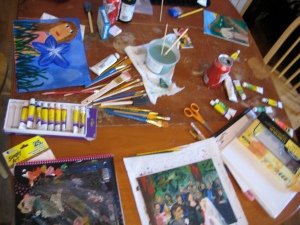 things all the time? In the end, you can forget I said all of this. And here, of course, is a related essay.
things all the time? In the end, you can forget I said all of this. And here, of course, is a related essay.
But I meant to tell you about Avengers saving the world with science (thank you JW) and popcorn in soup and the “monstrous and formless” which is more about writing than biological mutation.
But there isn’t time, as usual, so next month – when we spend forty-eight hours with forty-eight Irish Catholics drinking whiskey-coffee and beer all day in grass that smells like hot water and dirt.
I love the smell of dirt.
On the radio, they say that you can tell how socially powerful someone is by how infrequently they use the pronoun “I.”
Thank you Erin Markey for the pink cupcakes with glittery sprinkles – now I know I’m an artist.
Sincerely,
Lorelei Lee M.F.A.
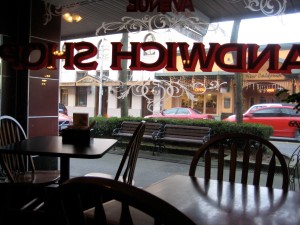 I’m learning how one becomes a nun, and I can see the appeal of it. At the Dominican Sisterhood in Elmira, they can pickles and crochet, they write and paint and they spend much of their time in “contemplation.” How dreamy.
I’m learning how one becomes a nun, and I can see the appeal of it. At the Dominican Sisterhood in Elmira, they can pickles and crochet, they write and paint and they spend much of their time in “contemplation.” How dreamy.
I love to tie knots. I love to tie up girls, that’s the truth. I love my job with its moments of slumber-party giggle and dance and of course it isn’t god that appeals to me, it’s devotion. I’m like everyone else: I want to turn the sound off. I want to be alone with things that don’t pay.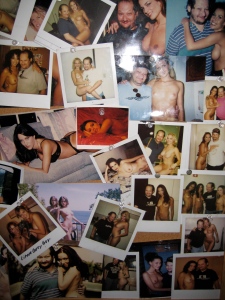
 Last week, Sister Spit kicked off their 2012 tour at the SF Library, who I am devoted to. I want to be a nun of the library. Erin Markey and I ate fried pickles in Union Square where everything is noise and I was jealous of her cross-country devotional. Being an artist might mean not being swayed by lace underpants and five-dollar chocolate bars and new dresses. It might be time to look away from the catalog, the catalogs, the cataloging of every sentence and minute into value-algorithm and ambition-schedule. Give me a daffodil, give me a lemon. It’s all grocery store, sofa sale, a joke about thread count. It’s all nail polish, button push, rain boot, gold bikini, tell a story. This week cloister, next week Canada. Time’s up.
Last week, Sister Spit kicked off their 2012 tour at the SF Library, who I am devoted to. I want to be a nun of the library. Erin Markey and I ate fried pickles in Union Square where everything is noise and I was jealous of her cross-country devotional. Being an artist might mean not being swayed by lace underpants and five-dollar chocolate bars and new dresses. It might be time to look away from the catalog, the catalogs, the cataloging of every sentence and minute into value-algorithm and ambition-schedule. Give me a daffodil, give me a lemon. It’s all grocery store, sofa sale, a joke about thread count. It’s all nail polish, button push, rain boot, gold bikini, tell a story. This week cloister, next week Canada. Time’s up.
Today my love and I play pinball at the laundromat and drink beer and wait for the blankets to dry. We have a lot of things. This is my fault. I think every book and blanket and pair of shoes has a story, and that when you get rid of things the story gets lost. It isn’t true of course. But it feels true. That’s the problem. I cried once because I had just realized I could never know all the stories of all the people in the whole world. I was twelve. That year I was very into thinking big thoughts and crying about imaginary things.
The truth is, you can learn a lot of stories. So many you will never remember them all. Last week, we were in Berlin, which was  not as cold as you would expect – a good thing, because my luggage was lost – and the East German make-up artist and the West German film festival employee told us their stories. The thing about this film festival is that they had a lot of employees who drove us from one place to another and made sure we had our tickets to everything and timed the make-up, the press events, the red carpet, the awards show arrival, with an incredible efficiency. Everything we found in Berlin was efficient and impressive. Grocery stores, coffee, hotel. Our guide spoke four languages, and in English she told us that when the wall came down, she was nine and her best friend’s family had just snuck through four countries to get to the west, which was two blocks from where she started. She didn’t know this about her best friend until after the wall came down, and they could just walk the two blocks back to the friend’s old house – which was empty by then. The neighbors had taken everything after they left.
not as cold as you would expect – a good thing, because my luggage was lost – and the East German make-up artist and the West German film festival employee told us their stories. The thing about this film festival is that they had a lot of employees who drove us from one place to another and made sure we had our tickets to everything and timed the make-up, the press events, the red carpet, the awards show arrival, with an incredible efficiency. Everything we found in Berlin was efficient and impressive. Grocery stores, coffee, hotel. Our guide spoke four languages, and in English she told us that when the wall came down, she was nine and her best friend’s family had just snuck through four countries to get to the west, which was two blocks from where she started. She didn’t know this about her best friend until after the wall came down, and they could just walk the two blocks back to the friend’s old house – which was empty by then. The neighbors had taken everything after they left.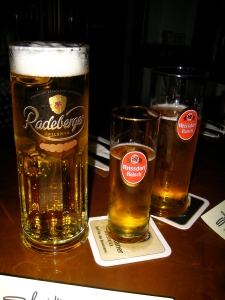
The East German make-up artist said that when the wall came down it was “like nothing.” And then she said “I mean like nothing else that I can ever describe.” She said it was “so big” and “so open.” She said that before the wall came down, you always knew where you were because if you walked far enough you’d come to the wall. Even if you were drunk, you could just follow the wall home. Sometimes, she said, it feels too open now. Sometimes, she wishes they would put the wall back. “From the East and the West is very different,” she said, “we are all brainwashed different.”
I told the make-up artist how I was embarrassed because the only German phrase I could seem to remember was “Sprechen sie Deutsch?” which would get me exactly no where. She laughed and laughed, curling my hair. “You are funny,” she said. Which is nice to be told, especially when it is mostly true by accident.
I recently wrote a letter to a lot of strangers about my grandmother, who is the most amazing whiskey-drinking, Bella-Abzug-admiring, pro-gay-rights Catholic feminist dime-store piano player. And since Stephen and I just wrote a movie in which the mother character is kind of a villain, I wanted to tell you that my own mother is actually completely amazing. My mother has been very excited about the movie, and she’s been watching everything you can find on the internet about the Berlin Film Festival, and really I wasn’t sure how she’d feel about it, since I just keep doing things that don’t make really great mom-conversation pieces – like her friends are all “my son just cured cancer” and my mom’s like: “oh my daughter’s a sex radical and she just co-wrote a movie where the mom  character is evil.” Or at least that’s how I imagine the conversations go. (It isn’t true, by the way, about the mom character – she isn’t actually evil – who is?). But see, my mom really loves me and tries to understand me even while she decides what we can and can’t tell my grandma. Even while I keep doing things like being a sex radical that she really, really can not understand, and has all kinds of complicated feelings around. Because in her own way, my mother was a sex radical too – in that she grew up Catholic and wanted to be an altar boy and prayed daily and believed everything and then, sometime around 1973, decided that birth control, abortion, and divorce weren’t mortal sins but choices that people might actually have to make sometimes. My mom has done a lot of changing in her life, and she’s changing for me too, even though I don’t make it easy.
character is evil.” Or at least that’s how I imagine the conversations go. (It isn’t true, by the way, about the mom character – she isn’t actually evil – who is?). But see, my mom really loves me and tries to understand me even while she decides what we can and can’t tell my grandma. Even while I keep doing things like being a sex radical that she really, really can not understand, and has all kinds of complicated feelings around. Because in her own way, my mother was a sex radical too – in that she grew up Catholic and wanted to be an altar boy and prayed daily and believed everything and then, sometime around 1973, decided that birth control, abortion, and divorce weren’t mortal sins but choices that people might actually have to make sometimes. My mom has done a lot of changing in her life, and she’s changing for me too, even though I don’t make it easy.
Last year, when I got married, my mom called me crying because she couldn’t pay for the wedding, which I guess she had gotten it into her head that she was supposed to do for some reason. Is that a tradition? I never wanted her to pay for the wedding, of course. I tried to tell her: “Mom,  your daughter is a big queer, and there are a million queers out there whose parents don’t even let their kids come home to visit. It’s enough that you love me so well.” Or that’s what I tried to say.
your daughter is a big queer, and there are a million queers out there whose parents don’t even let their kids come home to visit. It’s enough that you love me so well.” Or that’s what I tried to say.
I’m so, so grateful for my mom. I wanted to say that here. At my wedding, she did the splits on the dance floor. Oh yeah, my mom also used to be a gymnast and actually knows how to do the splits. All my friends cheered. She put her arms straight up in the air. My whole life she tried to get me to fight the patriarchy by not wearing pink or ruffles or girl things. At my wedding, she wore a pink dress, because of course, it is my favorite color.